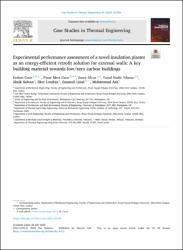Experimental performance assessment of a novel insulation plaster as an energy-efficient retrofit solution for external walls: A key building material towards low/zero carbon buildings

Göster/
Erişim
info:eu-repo/semantics/openAccessTarih
2023Yazar
Cüce, ErdemCüce, Pınar Mert
Alvur, Emre
Yılmaz, Yusuf Nadir
Saboor, Shaik
Ustabaş, İlker
Linul, Emanoil
Asif, Mohammad
Üst veri
Tüm öğe kaydını gösterKünye
Cüce, E., Cüce, P.M., Alvur, E. Yılmaz, Y.N., Saboor, S., Ustabaş, İ., Linul, E. & Asif, M. (2023). Experimental performance assessment of a novel insulation plaster as an energy-efficient retrofit solution for external walls: A key building material towards low/zero carbon buildings. Case Studies in Thermal Engineering, 49, 103350. https://doi.org/10.1016/j.csite.2023.103350Özet
Thermal insulation plasters have become the focus of attention in the building sector. Among the most important reasons for this is the high thermal energy losses of the buildings. Since conventional briquettes used in buildings allow high heat transfer, the construction industries are looking for alternative insulation ways with low cost and high thermal efficiency. The use of insulation plasters is becoming popular due to the high cost and installation of insulation materials such as Expanded Polystyrene (EPS), which is among the alternative ways. Therefore, in this study, the novel insulation plaster (NIP) developed in contrast to traditional insulation plasters is tested on conventional briquettes in different thicknesses. On considering the total heat transfer coefficient (U-value), it is understood that whilst the conventional briquette has the highest value with approximately 5.5 W/m2K, the briquette with 2-2 NIP thickness has the lowest value with a value of almost 2.86 W/m2K. As a result of the tests, the total heat transfer coefficient of the briquette with 1-1 NIP thickness is observed to have an improvement of nearly 22.5% compared to conventional briquettes, while a progress of approximately 36.4% is seen in briquettes with 2-1 NIP thickness. In addition, it is revealed that the best mitigation in the overall heat transfer coefficient is about 47.9% in briquettes with 2-2 NIP thickness. It is also figured out that NIP has additional thermal durability thanks to the dead air pores and boron minerals in its internal structure.

















